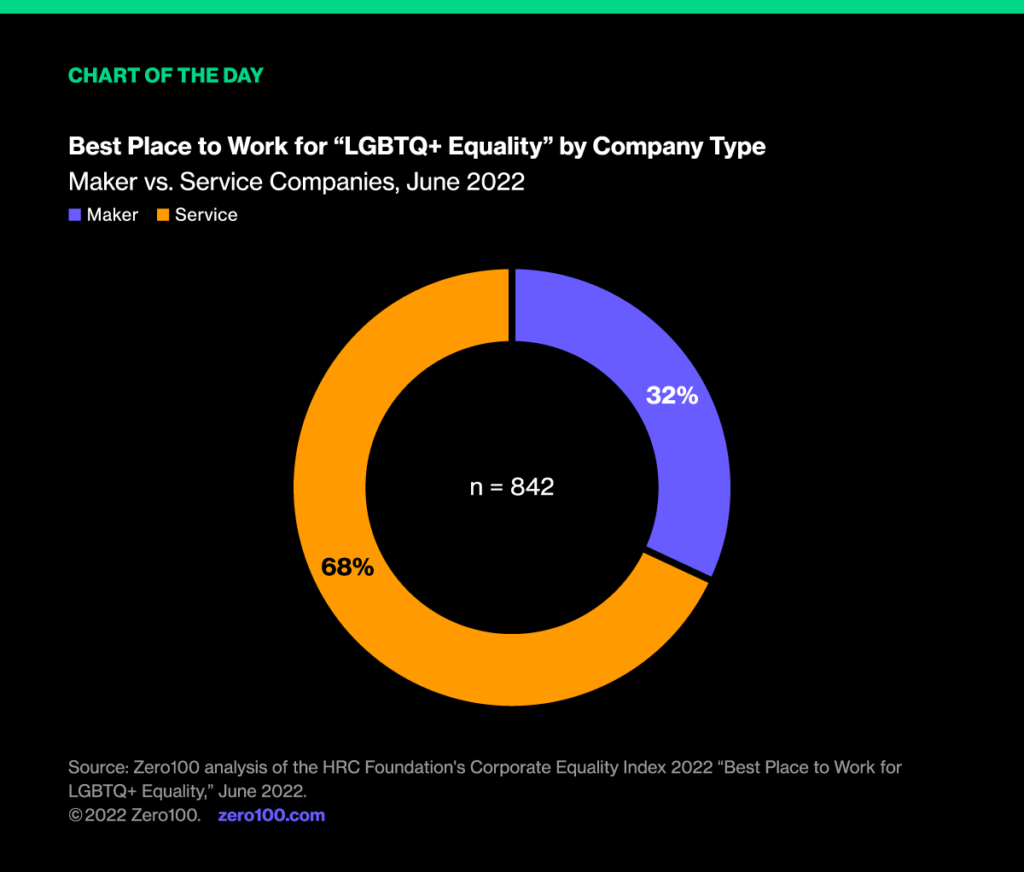
Celebrating Pride: Inclusion & Support from the Supply Chain Community
Zero100 found that professional services companies are twice as likely to be recognized for their efforts to support LGBTQ+ employees, when compared to producers of physical goods (“makers”). In recognition of Pride, we showcase supply chain companies that stand out in their support of LGBTQ+ colleagues via employee resource groups, health benefits, supplier diversity, and political action.
Pride
June is LGBTQ+ Pride Month, commemorating the Stonewall Riots of June 1969 with a “mix of celebration, protest, and political activism.” At Zero100, our mission is to accelerate the future of supply chain. This mission goes beyond functional areas of operations to include broad investments across Digital, ESG, and People. Within this broader purview, LGBTQ+ Pride sits at the intersection of ESG x People, where we consider how companies respect social issues in the communities they conduct business, and how they do right by both their employees and their customers.
Our Signal post this week focuses on how supply chain companies, especially producers of physical goods, can do more to keep pace with their peers specializing in professional services and technology. We further highlight notable examples of companies across the supply chain community, which are actively and consistently providing support to the LGBTQ+ community.
Best Places to Work: Makers vs. Services
As 7.1% of Americans now openly identify as LGBT (doubling over the past decade), it's more important than ever to provide a safe and respectful work environment, and to go beyond the basics to attract top talent. In the run-up to Pride, we reviewed the latest Human Rights Campaign Foundation's Corporate Equality Index (CEI). This benchmarking tool rates workplaces on “equality and inclusion for lesbian, gay, bisexual, transgender and queer employees.” In the 2022 CEI, 842 employers received top scores of 100 and earned the title “Best Place to Work for LGBTQ+ Equality.”
Our team conducted an analysis of this tool by categorizing included companies as a “maker” company that primarily creates and/or distributes physical products (e.g., Nike, SC Johnson, and Target), versus a “service” company that primarily offers professional services and/or digital products (e.g., Bank of America, McKinsey, Netflix, and Kirkland & Ellis).
The results shows that supply chain companies specializing in production under-index as the “best” places to work for an LGBTQ+ employee. We found that only 32% of the list were “maker” companies. Given that nearly half (44%) of U.S. employers qualify as “maker” companies, this cohort currently under-index on the top places to work as an LGBTQ+ employee.

Role Models
There are numerous ways that maker companies can level the playing field and accelerate their commitments. Prime examples taken from industry leaders include:
Employee Resource Groups: Creating a safe space for employees through affinity and employee resource groups helps support LGBTQ+ employees. Estée Lauder Companies (ELC) works closely with its employee resource group, wELCome, to build a workplace of inclusivity and compassion. In the wake of anti-transgender legislation and violence in 2021, ELC and wELCome made a statement denouncing the legislation and violence and standing with transgender and non-binary employees, consumers, and partners.
Health Benefits: Johnson & Johnson supports its employees individual and family health through inclusive benefits. Johnson & Johnson offers assistance with fertility treatments, adoption, and surrogacy for all employees. Benefits also include transgender-inclusive health insurance coverage and same-sex partner benefits, with medical and surgical coverage for U.S. employees diagnosed with gender dysphoria.
Leadership Development: In addition to prioritizing LGBTQ+ diversity among employees, companies are seeking to see LGBTQ+ representation in leadership positions. To support employee growth, Nike invests in its talent offering professional development opportunities through organizations including the Stanford LGBTQIA+ Executive Leadership Program.
Supplier Diversity: Diversity in supply chains extends beyond our employees, but to our partners and suppliers. SC Johnson works with its 400-member LGBTQ+ employee resource group IGN!TE to drive supplier diversity, partnering with the National Gay & Lesbian Chamber of Commerce to work with certified LGBTQ+-owned businesses.
Political Action: Companies are also using their voice to take political action to advocate for global LGBTQ+ rights. In 2020, Unilever signed the Declaration of Amsterdam, a global statement of support for LGBTQ+ rights, along with joining Open for Business, a coalition of global companies dedicated to advancing LGBTQ+ rights globally.
Through these investments, these enterprises underscore the impact of commitment and activism.
"Equality means more than passing laws. The struggle is really won in the hearts and minds of the community, where it really counts..."
Barbara Gittings (1932-2007)